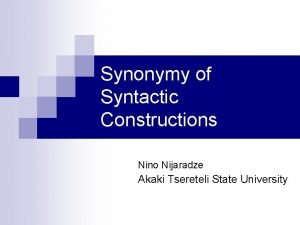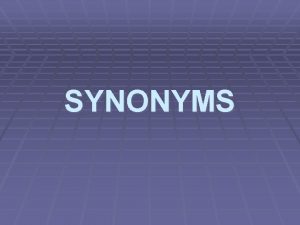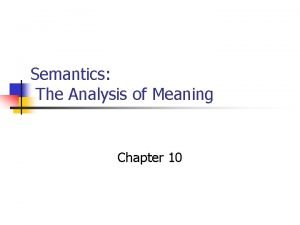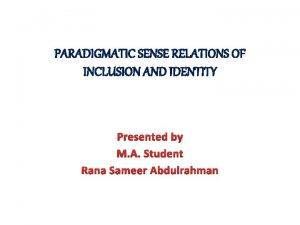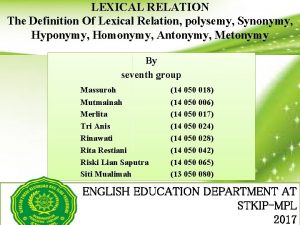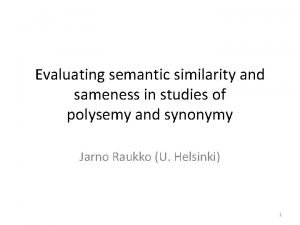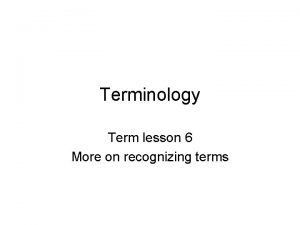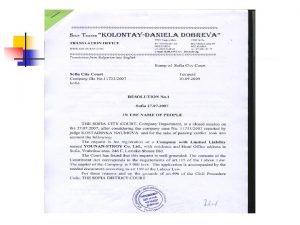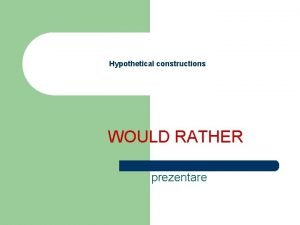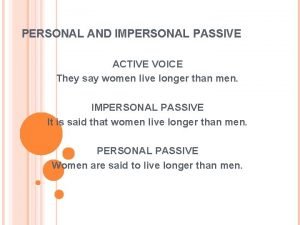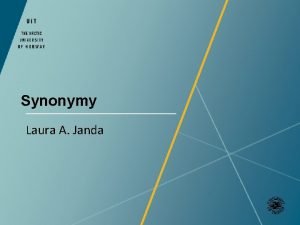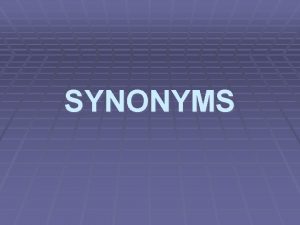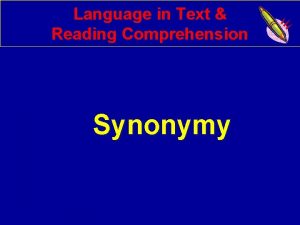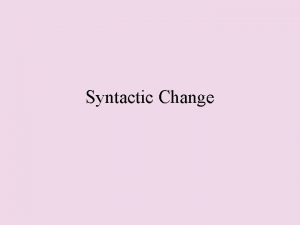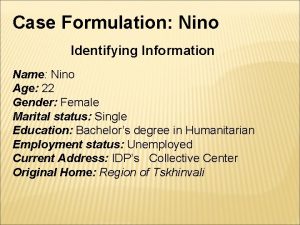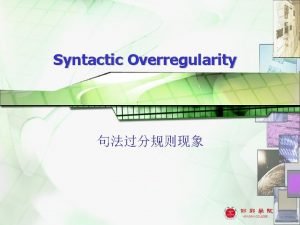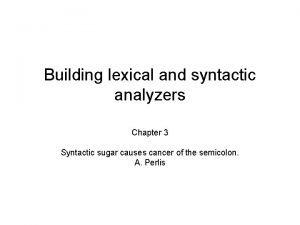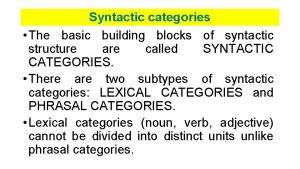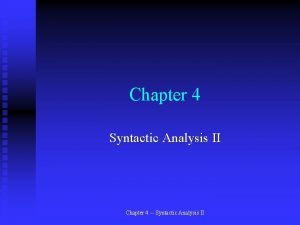Synonymy of Syntactic Constructions Nino Nijaradze Akaki Tsereteli



















- Slides: 19

Synonymy of Syntactic Constructions Nino Nijaradze Akaki Tsereteli State University

A bit of history n Henry Sweet (1891) – dependent clauses and participle groups ¨ Seeing a crowd, I stopped. ¨ When I saw a crowd, I stopped. ¨ Because I saw a crowd, I stopped n n Peshkovsky (1930) – term ‘grammatical synonyms’ Jespersen (1933) - grammatical synonymy ¨ Entering the room he greeted everyone most kindly. ¨ When he entered the room he greeted everyone most kindly.

n n Harris (1957) – transforms have practically the same meaning and differ only in their surface grammatical status Chomsky (1972), Chafe (1975), Katz (1972), Arutjunova (1971), Gak (1977), Shendels (1968), Barkhudarov (1973) Diachronic studies – e. g. translations of the Bible into Hungarian from XV to XVII cc (e. g. Domotor 2003) Sociolinguistics - Syntactic variation in the dialects of the same language (e. g. Adger and Trousdale 2007)

Like lexical synonyms, syntactic synonyms are generally identified on the basis of three main criteria: n similarity or identity of meaning n formal characteristics n functional interchangeability of synonyms

similarity of meaning n initial definitions focused on grammatical meaning ¨ grammatical synonyms - forms “showing full grammatical parallelism and differing only in the elements expressing the given grammatical meaning” (Kovtunova 1955)

n denotational meaning ¨ “homogeneous relations and connections of real-life phenomena” (Sukhotin 1960) ¨ conceptual similarity of sentences and their parts; this depends on the degree to which certain extralinguistic events can serve as indicators of time, cause, condition, etc. of other events and situations. n Complex relationships that extralinguistic phenomena establish are reflected by complex signification (Vlasova 1981)

The meaning of syntactic structures defined in terms of a ‘proposition’ and its structural-semantic organization as explained on the basis of predicateargument approach, each argument characterized by a semantic role in relation to the predicate

Definition of syntactic synonymy Syntactic synonyms are the units of a syntactic level that share predicateargument propositional structure and function, but differ in subjective modality and grammatical structure

syntactic synonyms n active and passive constructions if the same arguments are present (1)“Who was it that invented religion, and sin and all that? And why? ” John laughed. “It was invented by Adam” he said… Adam invented it. . .

active construction with the subject expressed by an indefinite pronoun (they, you, one) and the corresponding passive construction without a prepositional object 2. “They tell me there’s a man called Freud, an Austrian I believe-“ I’m told there’s a man. . 3. One never does anything if one does not try. Nothing is ever done… 4. If you wake a man up, he can’t go to sleep again because he is told to. If a man is woken, he can’t go to sleep again because he is told to/ because you tell him to.

Active and passive constructions cannot be considered synonymous if the agent is lost in the passive however clearly it may be identified in the immediate linguistic context. 5. “I tried to tell them, and my father gave me my first thrashing for telling lies. . . Then everyone was forbidden to listen to me… My father belonged to the old school. ”

n sentences with and without introducers it and there 6. There is a good film on tonight. A good film is on tonight. 7. It’s her damned virtue that caused the whole trouble. Her damned virtue caused the whole trouble. ‘it + to be + noun + relative clause’ it introduces direct or indirect object, adverbials of time, place, etc

n complex or compound sentences and corresponding simple sentences containing nominalized propositional constructions The relationship of synonymy holds between complex sentences and simple sentences containing non-finite clauses on the grounds that they both have polipropositional structure as they refer to (nominate) two or more extralinguistic events; ¨ convey temporal, causal, conditional, etc. relations between the events of objective reality; ¨ may be considered as syntactic variants of the same semantic invariant. Simple sentences containing non-finite clauses can be viewed as a marked member of the opposition whereas complex (or compound) sentence is unmarked. ¨

synonymy of polipropositional constructions n a simple sentence with direct word order and similar sentence with an inverted subject (infinitive or gerund) replaced by expletive it 8. Refusing invitations is not always easy. It is not always easy to refuse invitations n Complex sentence with a subjective clause and a simple sentence when its subject is expressed by gerundial phrase, accusative + infinitive or accusative + participle 9. His coming here is really desirable. It is really desirable that he (should) come. n Complex sentence with an objective subordinate clause and simple sentence when its object is expressed by expanded form of infinitive or gerund, for-to infinitive, gerundial phrase, accusative + infinitive or accusative + participle 10. I felt somebody touch my shoulder. I felt that somebody had touched/was touching my shoulder.

n Complex sentence with a relative (attributive) clause and a simple sentence when its attribute is expressed by infinitive (after the words the first, the last, the only, etc and some superlatives), of + gerund or the participle, often postpositional 11. The captain was the last man to leave the ship. The captain was the last man who left the ship. n Complex sentence with an adverbial subordinate clause and a simple sentence when its adverbial modifier is expressed by infinitive or for-to infinitive construction, gerund or its expanded form, present or past participle, absolute participle construction 12. I had to bite my lips in order not to laugh. I had to bite my lips so that I wouldn’t laugh.

n Main clause of a complex sentence or one of the clauses of a compound sentence is synonymous with a participle functioning as an adverbial modifier of a simple sentence 13. Opening the drawer he took out a revolver. He opened the drawer and took out a revolver.

n synonymy between simple sentences with direct and inverted word order ¨ Inversion may be caused by adverbs and prepositional phrases 14. Along this cool avenue my girlfriend led me. My girlfriend led me along this cool avenue. ¨ inversion of the subject when the sentence initial position is taken by predicate, object, participle construction, part of the compound nominal predicate 15. Playmates I found there. . . I found playmates there

Syntactic synonyms Active and passive constructions Subjective clause and subject of a simple sentence Sentences with and without introducers it and there Objective clause and object of a simple sentence Complex/ compound sentences and simple sentences with nominalised propositional constructons Attributive clause and attribute of a simple sentences with direct and inverted word order Adverbial clause and adverbial modifier of a simple sentence Main clause and an adverbial modifier expressed by participle

Thank you
 Kutaisi akaki tsereteli state university
Kutaisi akaki tsereteli state university Nino constructions
Nino constructions Sistema seguimiento nominal
Sistema seguimiento nominal Types of synonymy
Types of synonymy Lexical universals meaning
Lexical universals meaning Semantics example sentence
Semantics example sentence Partonym
Partonym Polysemy synonymy, hyponymy and antonymy
Polysemy synonymy, hyponymy and antonymy Polysemy examples
Polysemy examples Synonymy
Synonymy Square edge constructions
Square edge constructions Yg prefab ltd
Yg prefab ltd Draw segment sr the bisector of the vertex angle prq
Draw segment sr the bisector of the vertex angle prq I would rather
I would rather Bleyer constructions
Bleyer constructions Pronominal verbs passé composé interrogative
Pronominal verbs passé composé interrogative Personal impersonal passive
Personal impersonal passive Unknown angle proofs-proofs with constructions
Unknown angle proofs-proofs with constructions Sru projects hyderabad
Sru projects hyderabad Chrisos civil constructions
Chrisos civil constructions

